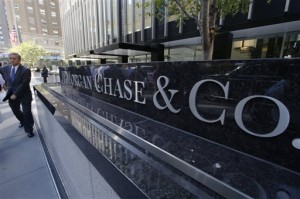
A businessman leaves JPMorgan Chase & Co. headquarters on Park Avenue, Thursday, Sept. 19, 2013, in New York. AP
WASHINGTON — JPMorgan Chase & Co. has agreed to pay a $100 million penalty and admitted that it “recklessly” distorted prices during a series of London trades that ultimately cost the bank $6 billion in losses.
The settlement announced Wednesday by the Commodity Futures Trading Commission comes less than a month after JPMorgan agreed to pay $920 million and admit fault in a deal with the Securities and Exchange Commission and other U.S. and British regulators.
The CFTC said JPMorgan traders in London sold off a massive volume of derivatives at once, distorting market prices. Derivatives are investments whose value is based on some other investment, such as oil and currencies. The market was largely unregulated before the 2008 financial crisis.
JPMorgan, the largest U.S. bank, admitted that its traders “acted recklessly” by dumping the derivatives on an index tied to corporate bonds, the CFTC said.
The agency said the traders were “desperate” to avoid further losses on their portfolio of the derivatives, and they sold more than $7 billion of them on Feb. 29, 2012, including $4.6 billion during a three-hour period. That was a “staggering volume” and by far the largest amount the division had traded in one day, according to the CFTC.
The traders realized that the huge volume of the derivatives they had amassed could affect the market, and they decided to do so, the agency said.
It marked the first time the CFTC used a new legal authority from the 2010 financial overhaul law that is designed to prohibit reckless market conduct.
Enforcement Director David Meister said the agency now is “better armed than ever to protect the market.”


